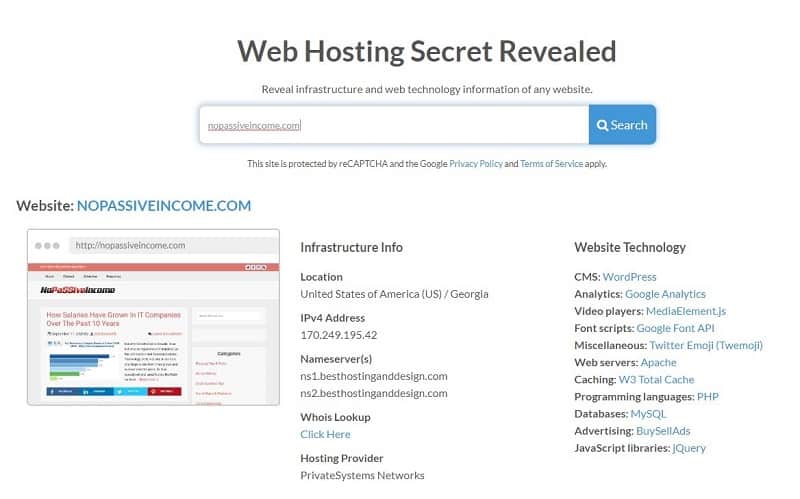Products You May Like
The short answer to this is no – you do not need a website to make money online. However, the reality is a lot more complicated than that. It would be more accurate to say that having a website can greatly increase your money making potential online.
Most of the reasoning behind this is simply control. By having your own website, you can control all aspects of it. That level of control is necessary to help you boost your search rankings, which in turns increases web traffic.
The more web traffic you get, the more you’ll potentially earn.
Before You Start

Before you rush off and build your own website, you need to consider what’s the best way of going about it. This can be easily solved with a little bit of detective work. What you want to do is have a look at a few websites that cover the same area of content you intend to.
From there, use the WHSR Tool and enter the URL of the website. The tool will then show you as much information it can gather about the site, such as the platforms it’s running on, what plugins might be used, or even the hosting it runs on.
Once that’s done, you can move on to the next step which is to actually build your site. Since you have an idea of what technologies are commonly used, pick one which you like and move on from there.
Remember though that knowing what your competitors are using doesn’t mean you have to follow them lock, stock, and barrel. Just use the information as a guideline to see what might be working for others.
Building the Website
Today, thanks to web applications like WordPress, it can be exceedingly easy to piece together a website. First of all, let’s consider the web hosting element. Choosing a good web hosting service provider will save you many headaches further down the road.
Next, use your chosen platform and simply start construction. Although this is generally up to the individual, I strongly advise you to focus more on performance of the site, rather than aesthetics at the beginning. A beautiful website is important, but most importantly, it needs to be fast!
This will help you gain more traffic later on, since performance is a key issue when it comes to ranking on search engines. More important than how it looks – consider where you’re going to place strategic items, such as prominent banners or other call-to-actions.
This type of planning can go a long way towards helping you sell more later on. Once that’s done, you need to get started on the most important area of your entire site – crafting the content.
Crafting Effective Content for Your Websites
One of the core reasons for building lots of content is that it will help you get traffic from search engines like Google. This is simply the most cost effective way of bringing in large volumes of potential customers.
Google will assess your content and decide if it’s worth sending web traffic to. It does this capricious – after all, those are people who are relying on the effectiveness of Google search. While there are technical guidelines to follow for building search-effective content, as a beginner, I advise you to rely on a few less technical points.
As a whole, it’s best to have a strong pool of perhaps 50 articles to start off with as your base. These should be relatively evenly built and address various topics that pertain to whatever you want to sell.
It’s best if you focus on developing articles that can really help your visitors out rather than simply gearing everything towards selling. Doing that can backfire badly.
1. Length of Articles
It can be very difficult for someone to learn something if content isn’t comprehensive enough. That’s why you should keep your articles to at least some basic lengths. To start off with, build articles that are at least 1,000 words in length. Anything below 500 and it won’t likely be very useful to your readers.
2. Be Detailed
Pay attention to the level of detail in your articles. This will also help you when it comes to length. Remember that your audience may vary widely and not everyone has the same comprehension capabilities. Explain the points you make carefully so that everyone has the opportunity to learn.
3. Use Images Prudently
Images can be a good supporting resource for your articles, but be careful not to over-rely on them. Too many images can break up articles unnecessarily and serve as a distraction to your readers. They also tend to be more resource heavy and might slow down your site.
4. Choose Your Topics Wisely
It can be very tempting to talk about something that’s new and exciting, but these topics often have short shelf lives. To draw in audiences continually, look towards building content that is evergreen. These can also later simply be updated to extend usefulness even longer.
Branching Out from Your Site
Once you;ve constructed your own website, it’s time to build links to the rest of the Internet. These links help search engines to gauge how well your site is accepted. In short, it signals to Google how trustworthy your site is and how highly other people recommend it.
One way of doing this is by exchanging links with other similar sites. However, it would be better to build natural links. These are embedded into content and help give search engines a better idea of context.
Conclusion
Content is the lifeblood of any website that wants to attract more traffic. As you can see, it can be a strong way of not just bringing in visitors, but ensuring that they are the right fit for your site. This helps you build an audience that is more likely to buy what you want to sell.
Of course, there are many other ways you can look towards building even more traffic, but that’s best left for another day. You will need to look towards social media channels, content optimizations, and perhaps even some parts of digital marketing.
